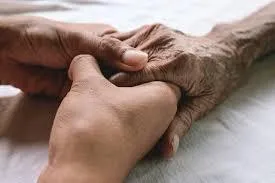
When a loved one expresses regret, what can we say?
Gerald was dying at home, attended by his wife and two daughters when he asked our hospice to send a counselor. He had earlier been visited by his priest, which as helpful, yet he was still disturbed. As I sat with him and his family, I learned that Gerald was deeply troubled about a memory of bullying a little boy when he was a child.
Judy, one of his daughters, was clearly agonizing over seeing her father so sad and remorseful. She had been relentlessly trying all morning to convince her dad with her best arguments that he was forgiven from any past misdeed. Gerald, however, remained haunted by his memory and it was tearing July’s heart out. In their presence, I invited Gerald to tell me the story of his bullying. Judy immediately interrupted, challenging his guilt, discounting his need to fully own his past behavior by telling his story. I asked Gerald to continue, and Judy was quiet. I tried to model, allowing Gerald to have all his feelings about his experience without expecting he do anything for the moment.
He needed to reinvestigate and wrestle with his memory and past behavior without pressure or judgment from others.
I asked, “Gerald, if you could somehow get a message to that little boy today, what would you like him to know?” There wasn’t a dry eye in the room as he conveyed his deep sadness about his behavior and asked the little boy, wherever he was, for forgiveness. I mused out loud how important it is that we all feel permission to remain engaged in the process of reconciling personal dilemmas. Gerald needed backing from those who loved him to feel as sad he really felt. He needed to tell that story again, after which he became very quiet and said our time together was helpful.
As I was leaving, Judy and I stood in the doorway, and I offered my observation that forgiveness toward self or others is really grief work. It is a process, not an event, and in finding reconciliation with being wounded or wounding another, one needs to travel through all the feelings caused by the experience. One needs to tell the story and feel the story. Only then can mercy for self or others become authentic. I’ve never observed forgiveness on demand work for anyone.I credited Judy for how much she loved her dad and how hard it was to see him hurting over this or any matter. I invited her to view her father’s angst as what his work of healing looks like. I felt privileged to teach Judy a little about companioning philosophy while modeling it for her.
-Companioning the Dying: A Soulful Guide to Caregivers by Greg Yoder